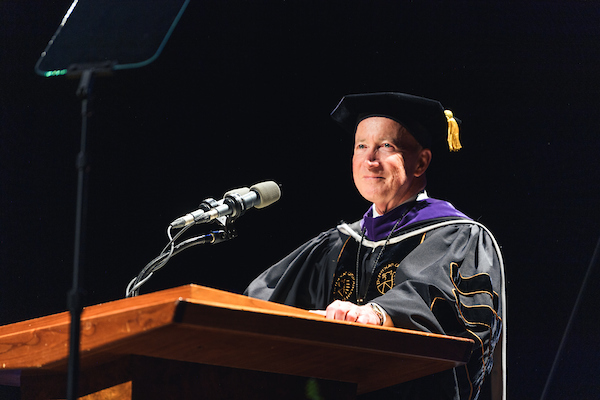
Forging A New Path in Business - Purdue’s reimagined business school will prepare business leaders for today’s challenges and tomorrow’s unknowns
“We want a school that is grounded in tradition but can create new industries. We’ll prepare students who can anticipate what will happen tomorrow and be prepared to meet its demands.”
That’s how David Hummels, Dr. Samuel R. Allen Dean, describes the vision for a reinvented business school. The plans were formally announced at the President’s Council dinner on September 23.

“Students in Purdue’s new School of Business will receive a well-rounded education, including the history, philosophy and economic theory of free market systems, and a firm grounding in the liberal arts and communication skills that come with it. They will enter the world proud of the careers they have chosen and thoroughly prepared for leadership and managerial excellence in the most technologically complex fields.”
Purdue President Mitch Daniels
Purdue is targeting next fall for the first phase of enhancements in the school, which involve student enrollment growth and the addition of targeted faculty, as well as curricular and experiential education additions. The new entity will be known initially as the Purdue School of Business. The Krannert name, which has informally been used for decades to describe the entire school, will be retained by the graduate programs, which was the original intent of donors Herman and Ellnora Krannert, as well as the Krannert Building.
Plans for the new school have been formulated through conversations between Purdue President Mitch Daniels, President-Elect Mung Chiang, and the Purdue Board of Trustees, which features four graduates of Purdue’s business school.
Scaling up
In order to prepare students who can drive innovation, bring discoveries to the marketplace, and effect societal change, the school will attract more top students to campus and strategically increase faculty size. It will house them in a new building that fits a forward-looking culture while promoting active learning and design thinking…creating a bold statement of who the school is and what it wants to be.
The new business school will increase undergraduate enrollment to 4,000 majors and double the size of current graduate programs. In addition, plans include providing a business minor to 20% of the university’s undergraduate population.
Harkening back to the school’s history of producing pioneers such as Vernon Smith (experimental economics), Frank Bass (marketing) and Arnold Cooper (entrepreneurship), faculty will be hired who can define areas of academic inquiry. In order to recruit and retain top talent, the school will increase the number of named chairs for established standouts and rising star awards for those showing promise early in their academic careers. Teaching also will remain a priority, and there will be an increase in the number of teaching awards to recognize top performers.

“Purdue will have a world-class business school through this relaunch, one that will carry out top-caliber research and educate many students who will be excellent at and proud of creating business growth and opportunities.”
Purdue President-Elect Mung Chiang
A winning combination
Purdue boasts some of the most highly ranked engineering, science and technology programs in the world. To truly transform the world, leaders and founders of technology companies must master the intersection of technology and business. As a result, two programs will become the flagships of the new school’s undergraduate offerings.
Integrated Business and Engineering launched in fall 2021, and the initial cohort drew twice the anticipated number of students. A partnership with the College of Engineering, students in the program graduate with a bachelor’s degree in business and concentrated coursework in engineering. Just as important, they participate in experiential learning projects that allow them to apply their classroom knowledge to real-world settings.
Business Analytics & Information Management, already offered as a top-ranked master’s degree program, will teach students to master the skills of gathering big data and using it to make informed decisions, a highly valued ability desired by employers. There is a dearth of talent in data science involving those who can bridge the gap between business goals and analytic efforts.
The goal is to have 200 new students enter each of the two programs each year, comprising 40% of the undergraduate population. In addition, the school is developing a new PhD program centered around business analytics applications, giving the school a presence in the field at all degree levels.
Learn by doing
Purdue offers high-level classroom instruction. But some of life’s most important lessons can’t be learned from a book or through a lecture. By switching the academic experience from passive to active, students become agile, critical thinkers capable of seeing—and then tackling—the world’s biggest challenges.
The new business school will include a major expansion in experiential and project-based courses. Students will be able to hone their skills through leadership immersion opportunities, case competitions, corporate consulting, research, and study abroad offerings.
Through student-centric initiatives, such as the Brock-Wilson Center for Women in Management and the Dr. Cornell Bell Business Opportunity Program, students can continue to develop leadership skills while building a valuable lifelong network. By growing the Honors program to 100 business students each year, or about 10% of each incoming class, more students can choose between a scholarly research project or an internship. The Larsen Leaders Academy, a community for the most motivated students, provides enhanced leadership training as well as access to many of the school’s most successful alumni.
Communication counts
Successful leaders must be able to clearly communicate thoughts, goals and visions. Students must be prepared to speak well, write well, and interact well. They also must develop an appreciation for the history, philosophy, and economic theory of market capitalism to convey the history of progress that freedom of enterprise has created.
Cornerstone for Business, a collaboration with the College of Liberal Arts, will give students the background into the why of business in addition to the how. Through study of transformative texts, they will gain a deep understanding of the development of economic history and thought.

“The university and its donors are investing in remaking our business school into a qualifier for top-10 status by adding departments, faculty, twice the space, and business majors for students interested in a business degree that includes a high-tech curriculum. As a result, they can be CEOs, presidents, and directors of companies driving our high-tech economy worldwide.” –Purdue Trustees Chairman Mike Berghoff (BSIM’85)
A strategic business writing course will focus on six key communication principles: audience analysis, communication ethics, connection, critical thinking and problem solving, diversity and inclusion, and emotional intelligence. Students will have access to a new writing lab, with video rooms for high-quality and virtual interaction, and space for consultation with the career services office on items such as resumes, cover letters, and interview prep.
The new school also will offer expanded opportunities through the Communication Center for students to participate in case competitions, which sharply enhance their communication skills, problem-solving abilities, teamwork and professionalism.
The goal is to imbue students with strong communication skills and a deep knowledge and appreciation of the history of business, allowing them to effectively build bridges between technology and humanity.
Transforming tomorrow
The school has undertaken a number of major steps over the past decade to position itself as a leader in business education. For example, the Dean V. White Real Estate Finance Program, announced last April, will provide an academic experience to equip students to succeed in the rapidly evolving real estate industry.
New online master’s degree programs have given working professionals the opportunity to advance in areas such as global supply chain management, human resource management, and business analytics without career disruption. Undergraduates across campus have also been given access to more online courses through the Summer Business Academy, and outgrowth of Purdue’s Think Summer initiative.
Now, it’s time to take the next giant leap. Technology needs business to change the world. Students need exposure to communication skills, hands-on learning and technological excellence to turn new discoveries into meaningful societal change.




